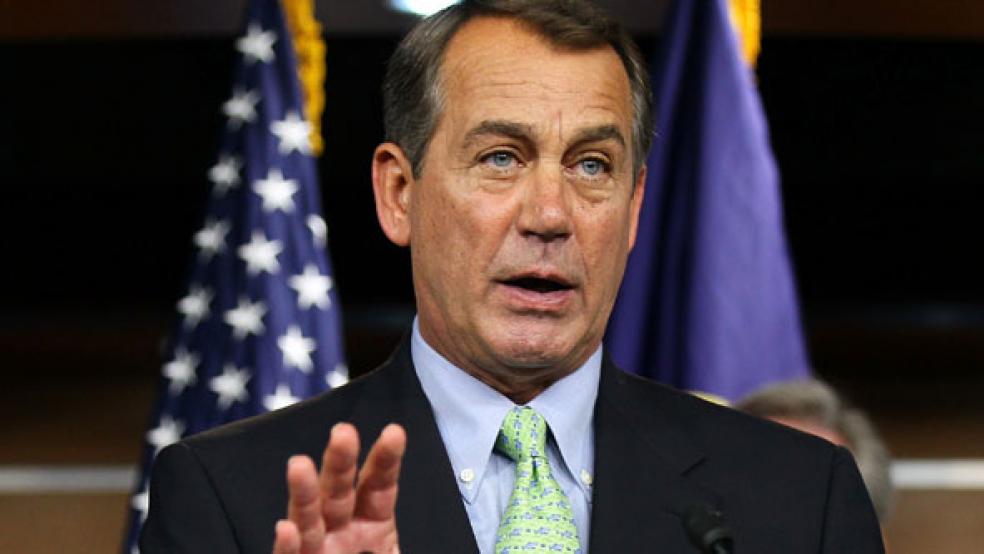House Speaker John A. Boehner (R-Ohio) racked up a much-needed political victory Wednesday when the House passed a budget proposal after a very rocky first three months of the new Congress in which unruly conservative members seriously complicated the Ohioan's efforts to govern.
For Boehner, the passage of the measure with majority Republican support was a welcome departure from weeks of discord in the GOP ranks that started with a long-shot attempt to displace him as speaker and escalated in a protracted fight over immigration and homeland security funding that left conservatives disgruntled and gave Democrats exactly what they demanded.
The GOP budget plan, which appealed to defense hawks, narrowly passed 219-208. GOP leaders used an unconventional voting process they hoped would allow Republicans with differing viewpoints to express their positions in votes on the House floor.
"I think they did a real good job of listening and taking our input," said Rep. John Fleming (R-La.). Fleming belongs to the House Freedom Caucus, a group of conservative members who have often clashed with GOP leaders.
Speaking after the vote, House Majority Whip Steve Scalise (R-La.) told reporters the vote was "right where we thought it would be."
Boehner used the "Queen of the Hill" rule to decide disagreements over six different budget proposals. Under the rule, the budget that received the most votes -- among those that passed -- was the one the House adopted and confirmed in a final vote.
The plan that passed is a revamped version of a proposal initially crafted by Budget Committee Chairman Tom Price (R-Ga.) that frees up more money for defense and strips a provision requiring lawmakers to offset some of that spending through cuts in other areas of the government.
Price's budget, released last week, would spend nearly $3.8 trillion in 2016 and projects revenue of just under $3.5 trillion for the next fiscal year.Republicans say the plan would balance the federal budget and create a surplus by 2024.
Related: The Government's $125 Billion Slap in the Face to Taxpayers
The original Price plan called for an additional $94 billion in an off-budget account to pay for fighting terrorism abroad and required some $20 billion of that money to be offset by spending cuts somewhere else. The idea was to boost defense spending beyond the $523 billion set by the 2011 across-the-board spending cuts known as sequestration.
But national security hawks felt that was not enough, giving rise to the second version of Price's plan: $96 billion in the off-budget account to fight terrorism and no requirement that $20 billion of it be offset by cutting funding elsewhere in the government.
So the House voted on both plans and the tweaked version won. In addition, it voted on four other budgets: A more conservative plan offered by the Republican Study Committee and more liberal plans from the House Democratic Caucus, the Progressive Caucus and the Congressional Black Caucus.
All four were rejected by the House.
While Republicans celebrated their win, Democrats continued to voice unhappiness with the Republican budget approach.
"Neither Prices are right here," said Rep. Chris Van Hollen (D-Md.), the ranking Democrat on the Budget Committee. He said they "both play games" with defense spending.
Related: Obama’s Transparency Promise Became a Big Fat Lie
The Senate is working toward passing its own budget plan later in the week. It has begun voting on a heap of amendments, a process that could keep lawmakers at work late Thursday into Friday morning.
Once both chambers pass a budget, they will have to hash out the differences in a conference. If they reach a compromise, it would pave the way for a simple majority vote in the Senate on repealing President Obama's signature health-care law under a process known as reconciliation. The Price budget calls for repealing the law.
While Obama would be certain to veto such legislation if it ever made it to his desk, it would be a vehicle for conservatives to register their lingering frustration with the law without facing a filibuster.
In recent days, it had looked like Boehner might not even be on a path to getting to this point, as defense hawks and fiscal hawks were at odds. It was the latest flare-up of internal tensions that have dogged Boehner since he took over as speaker in 2011.
In January, Boehner faced the biggest defection from an incumbent speaker in at least 100 years, as 25 Republicans voted against him for the top job.
Then, he was embroiled in a two-month standoff over funding for the Department of Homeland Security. Conservatives demanded using the funding to undo Obama's executive actions on immigration. At one point, they sank Boehner's plan to keep the standoff going for another three weeks.
The result: Boehner surrendered to Democratic demands not to touch Obama's immigration actions and fully fund DHS.
But as Congress gets ready to recess for two weeks, Boehner has a chance to reverse his fortunes and build some momentum headed into the rest of the year.
"It's a very unifying experience," said Scalise.
More From The Washington Post:





